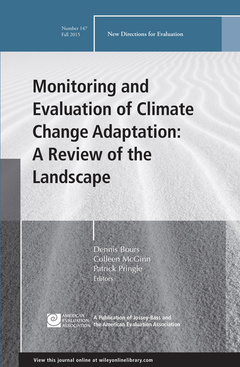Monitoring and Evaluation of Climate Change Adaptation: A Review of the Landscape New Directions for Evaluation, Number 147 J-B PE Single Issue (Program) Evaluation Series
Coordonnateurs : Bours Dennis, McGinn Colleen, Pringle Patrick

Monitoring and evaluation (M&E) of climate change adaptation (CCA) poses an assortment of thorny methodological challenges. Individually, none are unique to CCA, but together they represent a very distinctive conundrum facing practitioners and policy makers. Adding to this complexity further, climate change may be global in nature but its impacts, and how we respond to them through adaptation efforts, cut across scales, sectors, and levels of intervention.
As investments in climate adaptation increase, organizations are seeking to measure, assess and understand an array of adaptation initiatives, and derive learnings to inform policy and praxis. This issue presents findings from many of the most important contemporary CCA program evaluation research initiatives. The chapters represent the most coherent and current collection of CCA M&E research in this emerging and important field, written by many of its leading experts. Filled with examples and insights in formulating coherent responses to methodological challenges, it will be of interest to M&E scholars and practitioners globally.
This is the 147th issue in the New Directions for Evaluation series from Jossey-Bass. It is an official publication of the American Evaluation Association.
Dennis Bours, Colleen McGinn, Patrick Pringle
1. Evaluating Climate Change Adaptation: Learning From Methods in International Development 13
Susannah Fisher, Ayesha Dinshaw, Heather McGray, Neha Rai, Johan Schaar
This article reviews evaluation methods used in the field of international development to draw lessons for the specific challenges of evaluating climate change adaptation. This chapter concludes that although the methods are available, it is how they are applied that can help address these particular challenges.
2. An Actor-Oriented and Context-Specific Framework for Evaluating Climate Change Adaptation 37
Dunja Krause, Maria Schwab, J ¨orn Birkmann
The authors outline an assessment framework for evaluating climate change adaptation, which combines three major components: (a) the risk context, (b) individual decision making, and (c) adaptation assessment.
3. Exploring Program Theory to Enhance Monitoring and Evaluation in Ecosystem-Based Adaptation Projects 49
Madeleine C. McKinnon, David G. Hole
This article examines how two theory-based tools—theory-of-change models and evidence synthesis—can be used to instruct informative Ecosystem-Based Adaptation M&E by characterizing pathways to impact, identifying causal mechanisms, distinguishing relevant indicators, and recognizing areas of uncertainty.
4. An Approach to Monitoring and Evaluation of Institutional Capacity for Adaptation to Climate Change: The Case of the United Kingdom’s Investment in Ethiopia’s Climate-Resilient Green Economy 61
Rebecca Adler, Kirsty Wilson, Patrick Abbot, Ursula Blackshaw
This article focuses on capacity-assessment tools that support evidence-based self-assessments of progress towards the Ethiopian government’s climate change strategy.
5. Tracking Adaptation and Measuring Development in Isiolo County, Kenya 75
Irene Karani, John Mayhew, Simon Anderson
This article outlines the experiences of testing the feasibility of the Tracking Adaptation and Measuring Development (TAMD) framework in Kenya, and its use in assisting policy makers at the subnational level in adaptation planning, monitoring, and evaluation.
6. Meaningful Measurement for Community-Based Adaptation 89
Lucy Faulkner, Jessica Ayers, Saleemul Huq
This article presents a new framework for M&E for community-based adaptation, which has applications for general development practice as well as the specificities of climate change adaptation programming.
7. What Indicates Improved Resilience to Climate Change? A Learning and Evaluative Process Developed From a Child-Centered, Community-Based Project in the Philippines 105
Joanne Chong, Anna Gero, Pia Treichel
This article presents findings from a child-centered community-based adaptation project in the Philippines that has developed a practical and replicable process for developing evidence-based, local-level indicators of effective adaptation.
8. Linking Monitoring and Evaluation of Adaptation to Climate Change Across Scales: Avenues and Practical Approaches 117
Timo Leiter
This article outlines three avenues to link adaptation progress from national and subnational levels. It illustrates how information on adaptation interventions and evaluation results can be connected across scales in order to improve the evidence base for adaptation planning and decision making.
9. Monitoring, Reporting, and Evidence-Based Learning in the Climate Investment Funds’ Pilot Program for Climate Resilience 129
Christine Roehrer, Kouassi Emmanuel Kouadio
This article shares early experiences and emerging lessons from developing the Climate Investment Funds’ (CIF) Pilot Program for Climate Resilience (PPCR) participatory results-based monitoring and reporting system.
INDEX 147
Dennis Bours works as extended-term consultant for the Global Environment Facility’s Independent Evaluation Office.
Colleen McGinn is an independent research consultant and an expert in population coping, adaptation, and resilience and has a long track record in applied research, M&E, and program management.
Patrick Pringle is deputy director at the UK Climate Impacts Programme (UKCIP) based at the University of Oxford.
Series Editor-in-Chief:
Paul R. Brandon, University of Hawai'i at Manoa
Date de parution : 10-2015
Ouvrage de 160 p.
15x22.9 cm
Disponible chez l'éditeur (délai d'approvisionnement : 12 jours).
Prix indicatif 31,03 €
Ajouter au panierThème de Monitoring and Evaluation of Climate Change Adaptation... :
Mots-clés :
international; susannah; adaptation; methods; learning; climate change; dinshaw; international development; article; field; evaluation; lessons; johan schaar; specific; draw; concludes; available; particular challenges; krause
